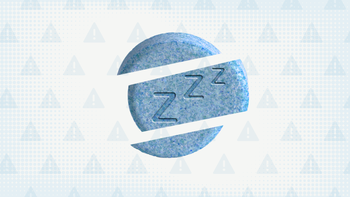
When Should You Take Melatonin? Plus 8 More Melatonin FAQs
Key takeaways:
Melatonin supplements can help your body relax and fall asleep easier. Most adults take around 3 mg to 5 mg of melatonin. It’s best to take it 1 to 2 hours before bedtime, so it has time to absorb and start working before you need it.
Melatonin supplements aren’t well regulated. So it’s hard to know exactly how much melatonin you’re taking. Look for certified products or ask your pharmacist for help.
Melatonin has side effects and drug interactions to consider. And there’s no safety information on taking it long term. Your healthcare provider can help you decide if it’s a safe option for you.
Access savings to related medications
Table of contents

Melatonin is a hormone naturally made in your brain. It helps regulate your sleep-wake cycle. Some people take additional melatonin as a supplement if they’re having problems sleeping.
But taking a melatonin supplement can be tricky. The dosage, timing, and even the amount of light in the room can affect how it works for you. Below, we will answer some common questions about taking melatonin, including when to take it for the best results.
1. What’s the best time to take melatonin?
In general, it’s best to take melatonin about 1 to 2 hours before you want to go to sleep. It can take some time for melatonin to start working, so taking it in advance helps ensure it will kick in when you need it.
You’ll also want to make sure you aren’t taking your melatonin too late in the evening. It can take 5 to 10 hours to clear melatonin from your system. So if you need to get up less than 8 hours after taking it, you may still feel groggy or sleepy the next day.
Good to know: Certain forms of melatonin work differently than others. You may need to do some trial and error to find the right form of melatonin and figure out when to take it based on your needs.
2. How does melatonin work?
Natural melatonin is made in the pineal gland of your brain. The pineal gland releases more melatonin in response to darkness, and less melatonin in response to light. Melatonin’s role is to let your body know it’s time to relax and prepare for sleep. So it’s thought that taking melatonin supplements may help if you’re having trouble sleeping.
Melatonin supplements contain synthetic (lab-made) melatonin. Taking melatonin may help you fall asleep faster. The extended-release forms may also help you stay asleep longer. Melatonin may also help you adjust to a new time zone that gets dark at a different time than you’re used to.

How to save using GoodRx



3. Can you take melatonin every day?
Yes, but you shouldn’t take it for more than a few weeks without a healthcare provider’s OK.
Melatonin doesn’t seem to be habit-forming. It isn’t a controlled substance, so dependence and misuse isn’t a concern, either. But that doesn’t mean it’s safe to take melatonin long term. If you need to take it for more than a few weeks at a time, talk to your healthcare provider. There could be a more serious health condition causing your sleep trouble.
Good to know: Most evidence shows that melatonin doesn’t cause tolerance. Tolerance happens when your body stops responding to a medication over time. And it’s common with other over-the-counter (OTC) and prescription sleep medications. But it doesn’t seem to be a concern with melatonin.
4. Does melatonin cause weight gain?
There’s not any evidence that taking melatonin leads to weight gain. In fact, there’s some evidence that it could help prevent weight gain caused by certain mental health medications. And another small study showed that melatonin may help lower body weight in postmenopausal women. But there’s not enough evidence to know if melatonin has any significant effect on body weight.
What we do know is that your risk for obesity goes up as the number of hours you sleep goes down. So if melatonin helps you get a full night’s rest, it could be the sleep itself that helps you maintain a healthy weight.
5. Does melatonin affect your blood pressure?
Most sources find that taking melatonin may lower your blood pressure. If you’re taking medication for high blood pressure, adding melatonin could lower your blood pressure too much. This doesn’t seem to be a common issue, but it’s good to be aware of it.
Symptoms of low blood pressure include feeling weak or dizzy. You should stop taking melatonin and contact your healthcare provider if you notice these symptoms while taking it.
Good to know: If you’re taking nifedipine (Procardia, Procardia XL) for high blood pressure, melatonin can make it less effective. So you shouldn’t take melatonin without talking to your provider first. A different sleep medication may be a better option for you.
6. How long does melatonin stay in your system?
The half-life of melatonin is around 1 to 2 hours. Half-life is how long it takes your body to remove 50% of the dose you took. In general, it’s estimated that it takes about five half-lives to remove most of an active drug from your body. So for many people, melatonin should be out of your system about 5 to 10 hours after you take it.
As mentioned, this is why it’s best to take melatonin at least 8 hours before you need to wake up. This helps ensure it’s out of your system by the time you wake up, which helps you avoid feeling tired or groggy in the morning.
7. How much melatonin should you take?
Most adults take 3 mg to 5 mg of melatonin. But it’s best to start with a lower dose and increase it from there to find the lowest dose that works for you. This helps keep melatonin side effects to a minimum. Doses up to 8 mg seem to be well tolerated. But higher doses can lead to more bothersome side effects and aren’t recommended.
Children typically take 1 mg to 2 mg of melatonin. Starting with a smaller dose is also a good idea to help minimize side effects. And it’s best to talk to your child’s provider first before starting melatonin. Sleep problems in children could have a number of causes, so it’s best not to treat them on your own.
8. Is melatonin safe to take?
Melatonin is considered to be a safe first-line treatment option for sleep issues. But that doesn’t mean it’s without risks. There are several things to consider about melatonin before taking it:
Melatonin supplements aren’t FDA approved or regulated. OTC supplements don’t have the same research and testing requirements that prescription medications do. Studies show that OTC melatonin products often contain different amounts of melatonin than the label indicates. Some even contain other substances, such as serotonin. Look for certified supplements to help protect your safety. And don’t hesitate to ask your pharmacist for help.
Melatonin has side effects to be aware of. Common melatonin side effects include headache, nausea, and dizziness. Daytime drowsiness and vivid dreams can also be an issue.
Melatonin can interact with other medications. It’s easy to overlook the fact that OTC supplements can still interact with other medications you take. And melatonin is no exception. Be sure to review your medication list with your provider to make sure melatonin is safe for you to take.
Long-term melatonin use isn’t recommended. There’s no information on the safety of taking melatonin for a long period of time. So it’s not recommended unless your provider OK’s it.
Melatonin may affect puberty in children. It’s possible that melatonin could delay the start of puberty in children taking it for a long period of time. More research is needed to confirm how much of a concern this side effect is. But it’s best to avoid giving children melatonin without talking to their provider first.
9. Can certain food or drinks affect melatonin levels?
Certain food and drinks contain high amounts of melatonin. Some, like milk and tart cherry juice, are often associated with a good night’s rest. But there’s not a lot of research that the melatonin in them makes much of a difference.
Other foods that contain melatonin include raw nuts, mushrooms, and fish. Again, there’s not a lot of information about how well the melatonin in these foods is absorbed. But adding them to your dinner plan may help improve your sleep over time.
The bottom line
Melatonin supplements can help signal your body that it’s time to relax and go to sleep. It’s best to take melatonin an hour or two before bedtime. This gives it time to absorb so it will kick in when you need it. It’s also a good idea to make sure you can get at least 8 hours of sleep after taking melatonin. This will help you avoid next-day drowsiness.
Most adults take 3 mg to 5 mg of melatonin. It’s fine to take it every day, but if you need it for more than a few weeks, it’s time to loop in your healthcare provider. Look for certified melatonin supplements to help protect your safety. And be aware that melatonin has side effects and drug interactions to consider. Your pharmacist and provider can help determine if melatonin is a safe option for you.
References
Arendt, J., et al. (2022). Physiology of the pineal gland and melatonin. Endotext.
Boafo, A., et al. (2019). Could long-term administration of melatonin to prepubertal children affect timing of puberty? A clinician’s perspective. Nature and Science of Sleep.
Cooper, C. B., et al. (2018). Sleep deprivation and obesity in adults: A brief narrative review. British Medical Journal Open Sport and Exercise Medicine.
Erland, L. A. E., et al. (2017). Melatonin natural health products and supplements: Presence of serotonin and significant variability of melatonin content. Journal of Clinical Sleep Medicine.
MedlinePlus. (2022). Melatonin.
Savage, R. A., et al. (2022). Melatonin. StatPearls.
Walecka-Kapica, E., et al. (2014). The effect of melatonin supplementation on the quality of sleep and weight status in postmenopausal women. Menopause Review.
Was this page helpful?
Related Articles
Browse medications
View AllResearch prescriptions and over-the-counter medications from A to Z, compare drug prices, and start saving.























